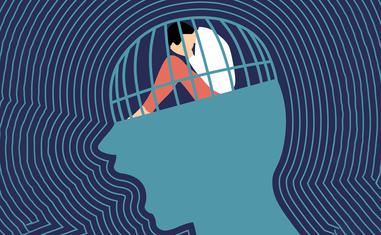The views expressed in our content reflect individual perspectives and do not represent the authoritative views of the Baha'i Faith.
Consider this terrible scenario for a minute: within the span of a year, literally everyone you love dies. Your entire family and your network of close friends all pass away. How would that feel?
For just about anyone with a functional human heart, this kind of massive tragedy — whether it came from a natural disaster, a disease or any other cause — would be unbearable beyond contemplation.
In war, though, it happens on a daily basis. Entire families, networks of friends, and neighborhoods, gone in seconds. The human savagery of war creates that scenario constantly, spreading death and destruction everywhere. The Baha’i teachings spell it out:
… war is made for the satisfaction of men’s ambition; for the sake of worldly gain to the few, terrible misery is brought to numberless homes, breaking the hearts of hundreds of men and women!
How many widows mourn their husbands, how many stories of savage cruelty do we hear! How many little orphaned children are crying for their dead fathers, how many women are weeping for their slain sons!
There is nothing so heart-breaking and terrible as an outburst of human savagery! – Abdu’l-Baha, Paris Talks.
For me, during the Vietnam war — where, because of my belief in the Baha’i teachings about peace, I served as a draftee and a conscientious objector and didn’t carry a weapon — that horrible outcome happened constantly, every stinking day. During my year in Vietnam, the war killed many of my close friends. Fellow soldiers who saved my life lost theirs. Sometimes they died right in front of me. As I looked into their eyes, the lights went out.
But I had no chance to grieve, because the next firefight or rocket attack or mortar barrage came too quickly, and more friends died, sometimes two or three or more in one day. In order to simply survive without a complete mental meltdown you had to put that trauma away somewhere, harden your heart, and keep going.
Somehow, I got through that war without a single wound — but when I returned I realized I’d been deeply wounded inside. I carried the war home with me, and felt its after-effects for the rest of my life. I still feel them today — a loss of the capacity for joy, a profound sadness, a deep anger at the injustice and pain of war. The trauma of combat, the constant fear, the meaningless slaughter, the wholesale loss of close friends, the delayed logjam of grief, all combined after the war to break loose inside and ravage my soul.
So am I a victim?
Personally, I never felt that way. I was lucky. I didn’t die. I made it home, largely intact, at least physically. I had, and still have, a Faith that kept me whole and grounded despite my grief.
Among the wider community of veterans, however, that question about victimhood has sparked a major controversy lately, called “the veteran as victim” debate. Generally, that debate centers around one question: when we ask others to fight and die for us, do we victimize them?
In the larger society, we’ve also begun to examine the idea of the victim mentality and victimhood in general, trying to answer some potentially tricky questions: who is a victim, and what qualifies anyone as a victim? Yes, we all suffer in life, but does that mean we have to let that suffering continually define and further victimize us? If I identify as a victim, does it victimize me even further?
When someone develops a victim mentality — which means they consider themselves a pervasive, universal and constant victim of wrongdoing by others — they can sometimes do so to absolve themselves of any complicity or fault in their suffering. We’ve all been hurt, but a consistent self-definition as a victim means blaming all of your misfortunes on others, and refusing to reflect on your own role in them. Yes, we each suffer as the victim of random events — just part of the natural course of life on this plane of existence — but that doesn’t mean we have to begin seeing ourselves as constant victims.
In light of those questions and in the interests of clarity, let’s start by checking the Webster’s Dictionary definition of the word:
victim: n. Latin victima 1. someone or something killed, destroyed, sacrificed, etc. 2. one who suffers some loss, especially by being swindled.
Learning a word’s etymology can help us understand it, and the Latin root victima originally meant “sacrificial animal or person.” Back then, to qualify as a victim, you had to die. In ancient cultures such sacrifices were often made to the gods, so perhaps victim also emerged from the Latin word vicis, which implies some kind of an exchange with a deity.
With this in mind, do you think of yourself as a victim? Here’s a short quiz, developed by a psychologist who specializes in the issue, which may help you answer that important self-reflective question:
Rate how much you agree with each of these items on a scale of 1 (“not me at all”) to 5 (“this is so me”):
- It is important to me that people who hurt me acknowledge that an injustice has been done to me.
- I think I am much more conscientious and moral in my relations with other people compared to their treatment of me.
- When people who are close to me feel hurt by my actions, it is very important for me to clarify that justice is on my side.
- It is very hard for me to stop thinking about the injustice others have done to me.
If you scored high (4 or 5) on all of these items, you may have what psychologists have identified as a “tendency for interpersonal victimhood.” – Unraveling the Mindset of Victimhood, Focusing on Grievances Can Be Debilitating; Social Science Points to a Better Way, by psychologist Scott Barry Kaufman, Scientific American, June 29, 2020.
After coming across this brief quiz in an article by the psychologist Barry Kaufman, and studying the in-depth analysis Scientific American recently published along with it, I felt compelled to learn more about this “tendency for interpersonal victimhood” and the victim mentality. Reading, listening to and watching the news lately has further sharpened my interest in the subject, because so many societies, including my own here in the United States, seem to have developed a heightened sense of mass grievance and interpersonal victimhood in recent years.
Intrigued even more by the subsequent research I did, I began to wonder what the Baha’i teachings had to say about the subject, so I delved into those insightful writings as much as I could. This series of articles reflects that research, and will hopefully help increase the understanding of what creates a victim, what contributes to victimhood, and how we can all get past our grievances and free ourselves of the victim mentality.

















Comments
Sign in or create an account
Continue with Facebookor